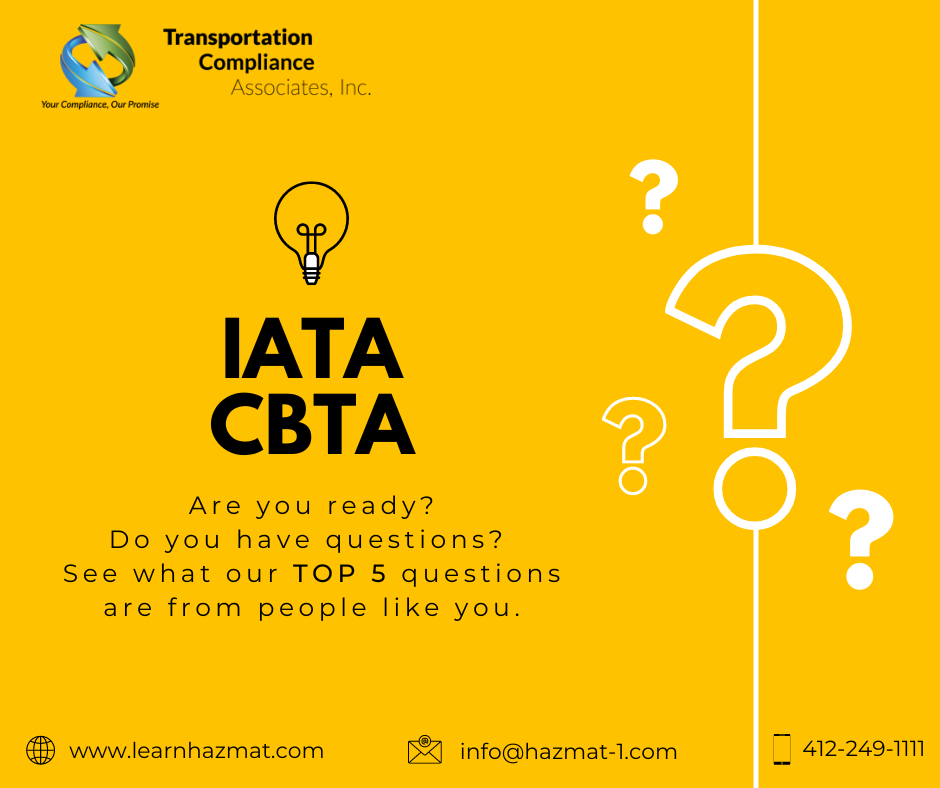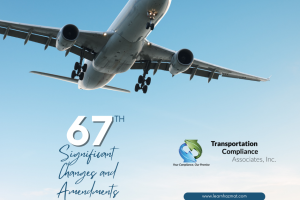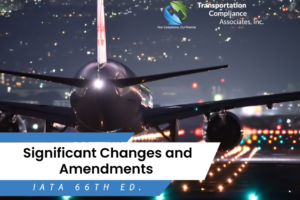Top 5 Questions About IATA CBTA

What You Need to Know for The New Year
We have received a lot of questions lately regarding the inevitable implementation of the new International Air Transport Association’s (IATA) Competency Based Training and Assessment (CBTA). We realize this transitional period can seem a bit overwhelming and confusing given so many different answers of what is changing and what is not changing.
That is why Transportation Compliance Associates, Inc. (TCA) has put together a list of what seems to be on the hearts and minds of our customers. So, without further ado, lets jump right into it!
Do I need to retrain January 1, 2023 if I just received training?
No. It is known to be true an IATA certification obtained prior to January 1, 2023 is valid until its 24-month expiration date; at which time, recertification must comply with IATA CBTA requirements.
What has changed (or some form of that question)?
The new CBTA approach improves on old training methods by providing function focused training. Centering on individual employee tasks conducted at the facility, individual level of competency, and post assessment of employee knowledge and proficiencies.
It also more specifically spells out the EMPLOYER responsibility within the new program.
64th Edition IATA Dangerous Goods Regulations (DGR) (Subsection 1.5.1.1.1)
“The employer of personnel that perform functions aimed at ensuring that dangerous goods are transported in accordance with these regulations must establish and maintain a dangerous goods training program.”
64th Edition IATA DGR (Subsection 1.5.1.2)
“The employer must ensure that personnel are competent to perform any function for which they are responsible prior to performing any of these functions. This must be achieved through training and assessment commensurate with the functions for which they are responsible.”
Simply put, taking a test on a broad range of subject matter is not enough. More focus has been placed on the employer’s responsibility to ensure their employees are competent within their job functions, CBTA establishes a more function focused training and assessment (including continued post assessment), and specifically declares that a training program “must [be] established and maintained.”
| Old-Style | CBTA |
| Based on Job Title | Based on job function |
| Subject-matter driven | Aims to reach performance |
| Wide range of knowledge | Tailored content and measurements |
| Continued post assessment |
Is Competency Based training mandatory?
Yes. Beginning January 2023 all initial and retraining will be conducted using the new Competency-Based approach. But, remember, as stated in question 1, if you have received initial or recurrent training prior to January 1, 2023, you have 24 months until you will fall under the new CBTA requirements.
Where Can More Information on This Training be Found?
All information on the new CBTA can be found in Appendix H of the 63rd Edition IATA DGR. You can also view our IATA CBTA Program Assignment of Responsibilities to get a more in-depth look at what the new training methodology looks like within a full dangerous goods training program.
And last, but certainly not least…
Can I Still use a Third-Party Training Company?
Contrary to popular belief, training and continual assessment can be provided by a third party (TCA, Inc.) or onsite assessor to evaluate the effectiveness of the program and provide constant improvements to an employee’s proficiency. In, layman’s terms “Yes.” Transportation Compliance Associates, Inc. can continue to provide the same industry leading training via onsite, live private webinar, or online without a gap in your compliance training. However, training is only one part of IATA’s CBTA program which contains 5 phases.
As stated above, we can help you with some, all, or none of the phases under the new CBTA program. That means, if you already have a training program that evaluates you employee’s competency, but lack the resources of training material, we can provide just the training portion for you. Vice-versa, if you have training material, but are unsure how to evaluate your employees, we can help develop a program for you to implement and aid you in determining the competency of your employees and the effectiveness of your program. Keep in mind though, ultimately it is up to the employer to determine competency of their employees at the end of the day.
If you made it this far, Gold Star for you! Hopefully you learned something here today about the new IATA CBTA program and what your responsibilities are as both an employee and employer. However, if you’re still confused or have other questions not listed here, reach out to us at 412-249-1111 for a 100% FREE Consultation or email us at info@Hazmat-1.com and one of our dedicated team members will be glad to answer all your CBTA questions.
And, if this your first time hearing about the upcoming CBTA, make sure to follow us on all our social media outlets (Facebook, Twitter, and LinkedIn) or opt-in to our newsletter to be the first to know when new content like this drops.




